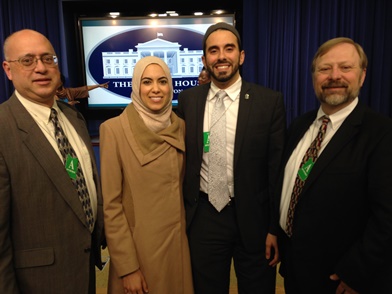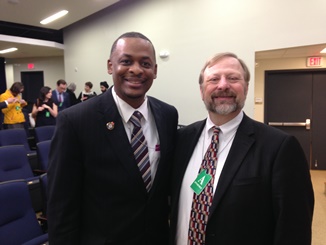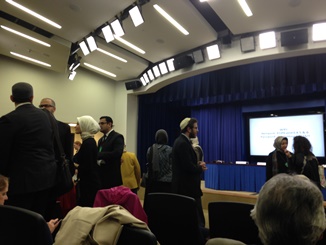White House Convention on Religious Pluralism
 Representatives from the Justice Department, Department of Education, Equal Employment Commission, and Federal Emergency Management Agency, discussed government policy and practice in assuring religious freedom and tolerance. Panelists from Atheist, Baptist, Catholic, Jewish, Muslim, and Sikh traditions expressed objectives and procedures for respectful but uncompromising coexistence. In an environment of fear spawned and sustained by global and national terrorism, reactionary or retaliatory violence against those of different (that is, minority) faith groups continues to be a serious problem. Yet a great bright spot is the frequent ability of faith-based groups to come together in times of crisis to partner in helping their local communities. Concrete, practical work at the grassroots neighborhood level is critical.
Representatives from the Justice Department, Department of Education, Equal Employment Commission, and Federal Emergency Management Agency, discussed government policy and practice in assuring religious freedom and tolerance. Panelists from Atheist, Baptist, Catholic, Jewish, Muslim, and Sikh traditions expressed objectives and procedures for respectful but uncompromising coexistence. In an environment of fear spawned and sustained by global and national terrorism, reactionary or retaliatory violence against those of different (that is, minority) faith groups continues to be a serious problem. Yet a great bright spot is the frequent ability of faith-based groups to come together in times of crisis to partner in helping their local communities. Concrete, practical work at the grassroots neighborhood level is critical.
Cheryl Bridges Johns, widely known for years of extensive ecumenical work with a broad range of Christian traditions, responded to a sense of global and national need for direct attention to Christian relations with other religious traditions as well. Of the White House meeting she noted that, “It was a very rich and rewarding day.” Johns further commented insightfully that, “We work together to make the stranger the neighbor and the neighbor our friend. America is most beautiful in many colors.” Certainly a great deal of information was distributed and high level networking occurred in the formal White House context.
 Tony Richie has been involved in interreligious dialogue and cooperation efforts for several years, including a recent Knoxville initiative that has been garnering widespread attention. He suggests that perhaps the main accomplishment of the White House in convening this special session was “to empower those working to interpret and apply American traditions of religious freedom and tolerance in today’s increasingly diverse and plural society.” Just this kind of critical frontline pastoral and theological work is urgently needed for addressing these times of extremism ranging, on one hand, from radical Islamist terrorism to, on the other hand, reactionary Islamaphobic hate crimes. Furthermore Jews, Christians, Sikhs, and others, are at times victims of religious intolerance.
Tony Richie has been involved in interreligious dialogue and cooperation efforts for several years, including a recent Knoxville initiative that has been garnering widespread attention. He suggests that perhaps the main accomplishment of the White House in convening this special session was “to empower those working to interpret and apply American traditions of religious freedom and tolerance in today’s increasingly diverse and plural society.” Just this kind of critical frontline pastoral and theological work is urgently needed for addressing these times of extremism ranging, on one hand, from radical Islamist terrorism to, on the other hand, reactionary Islamaphobic hate crimes. Furthermore Jews, Christians, Sikhs, and others, are at times victims of religious intolerance.
In short, over 100 invitees from around the nation, mostly Christians of various denominations but also many from other religions, including Jews, Muslims, Sikhs, and others, gathered at the White House. For its part, the White House Office of Faith-based and Neighborhood Partnerships affirmed them and their work and assured them of this administration’s staunch support. Advocates for religious liberty were encouraged to rely on their government’s leadership and resources for ratcheting up the work of getting out the message of religious freedom and diversity in the United States of America.
 As a Pentecostal believer with a high view of biblical inspiration and authority, Richie observes scriptural support for religious tolerance (2 Kings 5:18-19), separation of Church and State, (2 Chronicles 26:16-21), and freedom of conscience regarding religious matters (Romans 2:14-15). Therefore, religious freedom is a unique principle supported by not only the United States Constitution but, more importantly, God’s Word. Theologically, the well-known Pentecostal emphasis on pneumatological liberty has obvious affirmative implications for the political doctrine of religious freedom. Accordingly, religious liberty can and should be a valuable tool for overcoming religious prejudice and persecution on all sides in today’s increasingly pluralistic society. And Pentecostals can and should be at the forefront of the fight for freedom!
As a Pentecostal believer with a high view of biblical inspiration and authority, Richie observes scriptural support for religious tolerance (2 Kings 5:18-19), separation of Church and State, (2 Chronicles 26:16-21), and freedom of conscience regarding religious matters (Romans 2:14-15). Therefore, religious freedom is a unique principle supported by not only the United States Constitution but, more importantly, God’s Word. Theologically, the well-known Pentecostal emphasis on pneumatological liberty has obvious affirmative implications for the political doctrine of religious freedom. Accordingly, religious liberty can and should be a valuable tool for overcoming religious prejudice and persecution on all sides in today’s increasingly pluralistic society. And Pentecostals can and should be at the forefront of the fight for freedom!
Notes
[1] An original working title given to attendees and participants in planning and development stages included words such as “religious freedom,” “religious inclusion,” and “religious tolerance,” along with the final “religious pluralism.” It became pragmatically necessary to shorten the title. While efforts to not exclude the earlier themes were to an extent successful, I think the emphasis shifted slightly toward religious pluralism. Yet an affirmation of religious freedom was an undergirding element throughout. For me, that is a critical component.
Category: Ministry, Winter 2016


